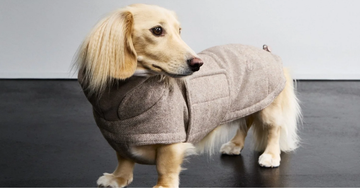We have asked veterinarian, Cand. Med. Vet. Stine Christensen, what issues she encounters in her daily work with dogs and their owners. As well as how we as dog owners – and with our platform – can learn more about our beloved four-legged friends, so that we ensure a long and healthy dog life. One question, however, requires special attention. Read here Stine's advice on obesity in dogs.
Is my dog overweight?
This is one of those questions that I, as a veterinarian, have to be extra careful about how I answer. Because I have no interest in scolding or making dog owners feel guilty when I point out that their dog is overweight. But it is an incredibly important topic nonetheless.
We can all agree that we love our four-legged friends dearly. We can also agree that we often end up treating them like ourselves – we think they should have something delicious because it's a natural way for us humans to show love.
But you probably already guessed where I'm going. Because raising an overweight dog is actually anything but loving. It causes a whole host of health problems that could have been avoided if the dog remained a normal weight. In fact, our pets' lifespan can be extended by 1–2 years on average when they stay healthy and slim throughout their lives.
How to tell if your dog is overweight
The clear signs of being overweight are a difficult movement pattern – especially during exercise. Being overweight can also cause problems with heat tolerance, reduced resistance to infections and a generally lower quality of life. It also increases the risk of anesthesia.
- Position yourself so that you are standing directly above your dog. A clear waist should be visible at the transition from the chest to the belly.
- Your dog's belly should not hang or be round.
- Feel the dog's ribs – they should be felt just under the skin, but you shouldn't be able to see them all.
- You should be able to feel the bones at the bottom of the back around the tail.
Who should I ask?
It (unfortunately) rarely helps to ask other dog owners. Because over the years, more and more dogs have become overweight – so we have become accustomed to the idea that “a little chubby” is normal. As a result, many of us become blind to what is actually healthy and optimal.
I often meet dog owners with beautiful, slim dogs who say they are met with criticism from others who think they are starving their dogs. It is important to remember that the veterinarian's assessment is the most competent when it comes to a dog's ideal weight.
What diseases are overweight dogs at risk of?
There is so much to gain from having a slim dog. It can be motivating to think about all the diseases you can reduce the risk of by keeping your dog slim:
- Arthritis – An overweight dog puts unnecessary strain on its joints. Joint changes can be difficult to avoid with age, but the degree of pain is significantly lower in lean dogs.
- Overloaded liver – Fat accumulates in the liver and puts it on overtime.
- Diabetes and pancreatitis – A high calorie intake can overload the pancreas and increase the risk of diabetes.
- Cardiovascular and lung diseases – The heart and lungs are unnecessarily stressed by excess weight, which can lead to circulatory problems.
If you've realized that your dog is overweight, the first step has been taken. Now you can begin the process of gradual weight loss – and your dog will love you even more for it.
Kind regards
Cand. Med. Vet.
Stine Luise Krogh Christensen
We have compiled our selection of products that are ideal for dogs that are overweight or tend to be overweight. See them here:





